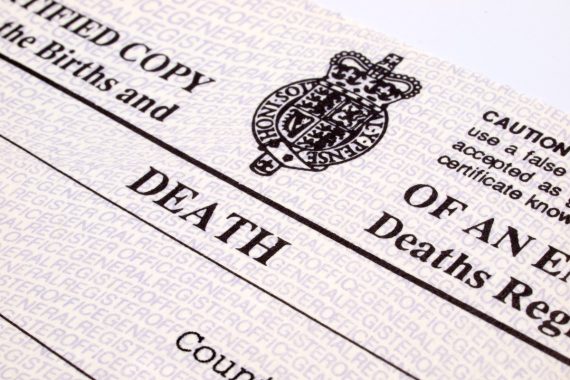A new system requiring GPs to agree death certificates with a medical examiner has already ‘improved accuracy’ of recorded causes of death, ahead of its statutory implementation, NHS England has claimed.
The process has been ‘supporting bereaved people and providing the public with greater safeguards’ through ‘consistent scrutiny’ of non-coronial deaths, the commissioner added in new guidance on the system.
From 9 September all deaths that are not investigated by a coroner must be reviewed by NHS medical examiners. The start date was announced by the Government as part the new Death Certification Reforms in April, following multiple delays, however GPs in some areas are already using the system.
NHS England has said that as of June this year, while operating ‘on a non-statutory basis’, medical examiners have ‘independently scrutinised’ over 900,000 deaths in England and Wales, and that they expect the new system to improve the process.
The new NHS England guidance, published on behalf of the National Medical Examiner for England and Wales, said: ‘There are already signs medical examiners are improving the consistency and appropriateness of referrals to coroners, and we expect their work will improve the quality and accuracy of recorded causes of death, benefitting analysis and research.’
The document, effective from 9 September, set out standards for medical examiners and provided guidance for implementing them.
The National Medical Examiner recommends that medical examiners should be consultant grade doctors or other senior doctors from a range of specialties (including GPs) with an equivalent level of experience.
From 9 September, any GP who has ‘attended the deceased in their lifetime’ will be eligible to be an attending practitioner, which simplifies the current requirements whereby GPs or clinicians are only eligible if they have attended the patient during their last illness.
The medical examiner system has been designed to:
- provide bereaved families with greater transparency and opportunities to raise concerns
- improve the quality and accuracy of medical certification of cause of death
- ensure deaths are notified to coroners where appropriate
- support local learning and improvement by identifying matters that require escalation to local clinical governance and other processes
- provide the public with greater safeguards through improved and consistent scrutiny of all non-coronial deaths
- align with and inform existing clinical governance processes
Source: NHS England guidance
The process means GPs have to give access to a deceased patient’s records in order for the ME to reach agreement on the accuracy of the medical certificate of cause of death (MCCD), where before this extra scrutiny was not required.
From 9 September 2024, the Access to Health Records Act 1990 gives medical examiners ‘a specific statutory right of access’ to records of deceased patients that they consider relevant when carrying out their duties.
The document added: ‘Medical examiners carry out a proportionate review of medical records. They also interact with attending practitioners and bereaved people.
‘Through these activities, medical examiners will sometimes detect concerns or issues with the care provided to the deceased person, either during their last illness or historically.’
However, medical examiners do not investigate concerns ‘in depth’ but instead they refer any concerns to ‘established clinical governance processes for review’, NHS England said.
The independent scrutiny carried out by medical examiners must comprise:
- a proportionate review of medical records
- reviewing the causes of death proposed by the attending practitioner and considering whether the coroner needs to be notified
- asking bereaved people whether they have questions about the cause of death or concerns about the care of the deceased person before death
Source: NHS England guidance
According to NHSE communications earlier this month, the Department of Health and Social Care has started delivering the new Medical Certificates of Cause of Death to GP practices.
‘Many MCCDs have been distributed and deliveries to practices are on track to be completed by the end of July,’ it added.
The new MCCD must be used for all deaths from 9 September 2024, but cannot be used before this.
GP practices which use MCCDs and have not yet checked they are on DHSC’s distribution list must do so immediately to ensure DHSC deliver new MCCDs to them in good time.
Ahead of the launch of the new system, the BMA had warned that it would be ‘administratively burdensome’ for GP practices, and that some MEs may not have capacity to provide scrutiny for community deaths within ‘reasonable timescales’.
Pulse October survey
Take our July 2025 survey to potentially win £1.000 worth of tokens

















Not 100% convinced. Last 3 MCCD questioned after 30 years of signing the same. Worst followed appropriate coroner procedure & agreed but then ME says otherwise😂😂 Perhaps I need to go back to primary school??
Scrutiny of care not a bad thing until unprincipled solicitors access the information.
I don’t mind a bit of extra scrutiny. But how do they know it’s more accurate? Are there confirmatory PMs…or more likely when a medical examiner who has never met the patient decides that they have a different professional opinion on the cause of death than the GP who knew the patient they are assuming the medical examiner is correct without any evidence.
Issued death certificate.
ME wanted it changed, so changed it.
Registrar refused to accept ME suggestion, referred to coroner.
Coroner accepted my original cause of death.
Waste of time.
Delays for the family.